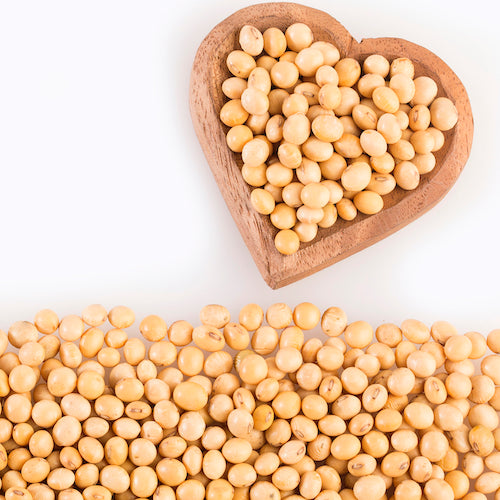Soy Protein: A Nutritious Addition To Your Diet
Posted on April 10 2023
Although the significance of protein in the human diet is undeniable, those looking for a plant-based diet still find it challenging to determine which options are rich in quality protein.
Which foods should one consume to receive the appropriate nutrients in their diet? One simple answer is soya. This guest post looks at looks at the nutrition of soy protein.
Many people who prefer a plant-based diet are recently turning to soy-based foods like tofu, miso, and edamame and meat alternatives such as tempeh. Few plant-based products are as nutritionally beneficial as soy protein. Soy is a complete protein source and is rich in all the nine essential amino acids that the human body cannot release on its own and must obtain from food.
This post will explain how soy is an excellent protein source and an all-around nutritional package. Please continue reading to discover why you should incorporate soy protein into your vegan diet.
What is Soy Protein, and What Does It Contain?
Soy protein is fundamentally a protein that is isolated from soybeans. Sustainable soybeans such as those at US Soy, are first cleaned and conditioned, then de-hulled and bundled into flakes. Consequently, the flakes are pressed to remove soy oil, leaving behind defatted soybean flakes. The defatted soybeans are further processed to produce three high-protein products – soy flour, soy protein isolate, and soy protein concentrate.
Soy protein contains around 90% plant-based protein and fiber. It contains low saturated fat and is a more cost-effective way of consuming a balanced diet. Soy is also rich in vitamin B, magnesium, potassium, fiber, etc. Since it contains fiber, soy fills you up, making you feel satisfied – this can benefit those watching their weight.
Notably, it’s a great source of isoflavones, also known as protein estrogens, which enhance bone health and minimize the risk of breast cancer in menopausal women. Moreover, soy provides a slew of minerals and vitamins that decrease the risk of chronic illnesses.
Why Soy Protein is a Nutritious Addition for Vegans?
1. Ideal for vegans with low protein levels
As mentioned earlier, most plant proteins are low in one or more essential amino acids, making them unable to offer a high-quality yield. On the other hand, soy protein is a superior vegan protein source packed with an exclusive profile of essential and non-essential amino acids. It contains plenty of arginine, tryptophan, and phenylalanine. In addition, soy protein is the perfect substitute for dairy protein and is particularly helpful for lactose intolerant people (those with milk protein sensitivity).
2. Great for people experiencing dairy allergies
Many people experience allergies, especially lactose intolerance, caused by consuming dairy-based products. Soy protein is dairy-free and the perfect option for lactose intolerance people. It’s also essential to note that soy protein provides significant calcium per serving. Therefore, you don’t need to worry about your diet missing dairy, as soy contains sufficient calcium and the necessary amino acids for protein synthesis.
3. Improve heart health
Most plant-based foods are linked to improved heart health because they have higher fatty acids and essential phytochemicals, such as antioxidants. Soy protein is a heart-healthy diet because it is low in saturated fats and fat content. It also contains cholesterol-reducing effects that reduce blood cholesterol levels and maintain optimal cholesterol range.
Moreover, soy protein contains bioactive peptides with several physiological functions, such as antihypertensive, hypolipidemic, immunomodulatory, antioxidant, and anti-inflammatory properties. The isoflavones are rich in antioxidants, obstructing LDL oxidation and plaque build-up in the arteries. Therefore, soy protein can help you replace less healthy foods with high cholesterol and saturated fats.
4. Helps in losing weight
A protein-rich diet substantially contributes to weight loss as it keeps you satiated, preventing you from consuming excess calories. Furthermore, the human body spends more energy breaking proteins down; hence you burn more calories when you intake protein-rich foods, such as soy.
Taking a weight-loss diet should not make you nutrient-deficient. Although soy protein reduces calories, which is crucial for losing several pounds, it doesn’t limit nutrients. Instead, it boosts your metabolism by encouraging fat-burning while enhancing lean muscle mass.
5. Possibly reduces the risk of cancer
It may sound absurd that soy is related to cancer. As mentioned above, soy protein contains phytoestrogens, and high estrogen levels can substantially reduce the risk of breast cancer. In regions where people start consuming soy from a young age, such as Asian nations, pre, and post-menopausal women have a minimal risk of contracting breast cancer.
Soy protein also reduces the risk of contracting other cancer types. Studies indicate that consuming soy can slightly decrease the threat of gastrointestinal cancers and has a protective impact on prostate cancer survivors. Furthermore, high-fiber diets lead to a low risk of colon cancer, and soy foods, such as tempeh and edamame, are rich in roughage.
Green Goddess has several recipes using tofu on their blog, here are some of the favourites...
Eden Vegans Everything Green Curry
Vietnamese Slaw with Crispy Baked Tofu
Final Thoughts
Seeing the benefits associated with soy protein, it’s easy to understand why this legume has been gaining immense popularity in recent years. Soy protein is a complete protein source, meaning it possesses the amino acids the body doesn’t produce on its own. Besides proteins, it’s rich in a wide range of nutrients that many plant foods don’t contain. Therefore, all these benefits show why it would be best to incorporate soy protein into your vegan diet. Use this guide to understand the benefits you can obtain from this legume.


